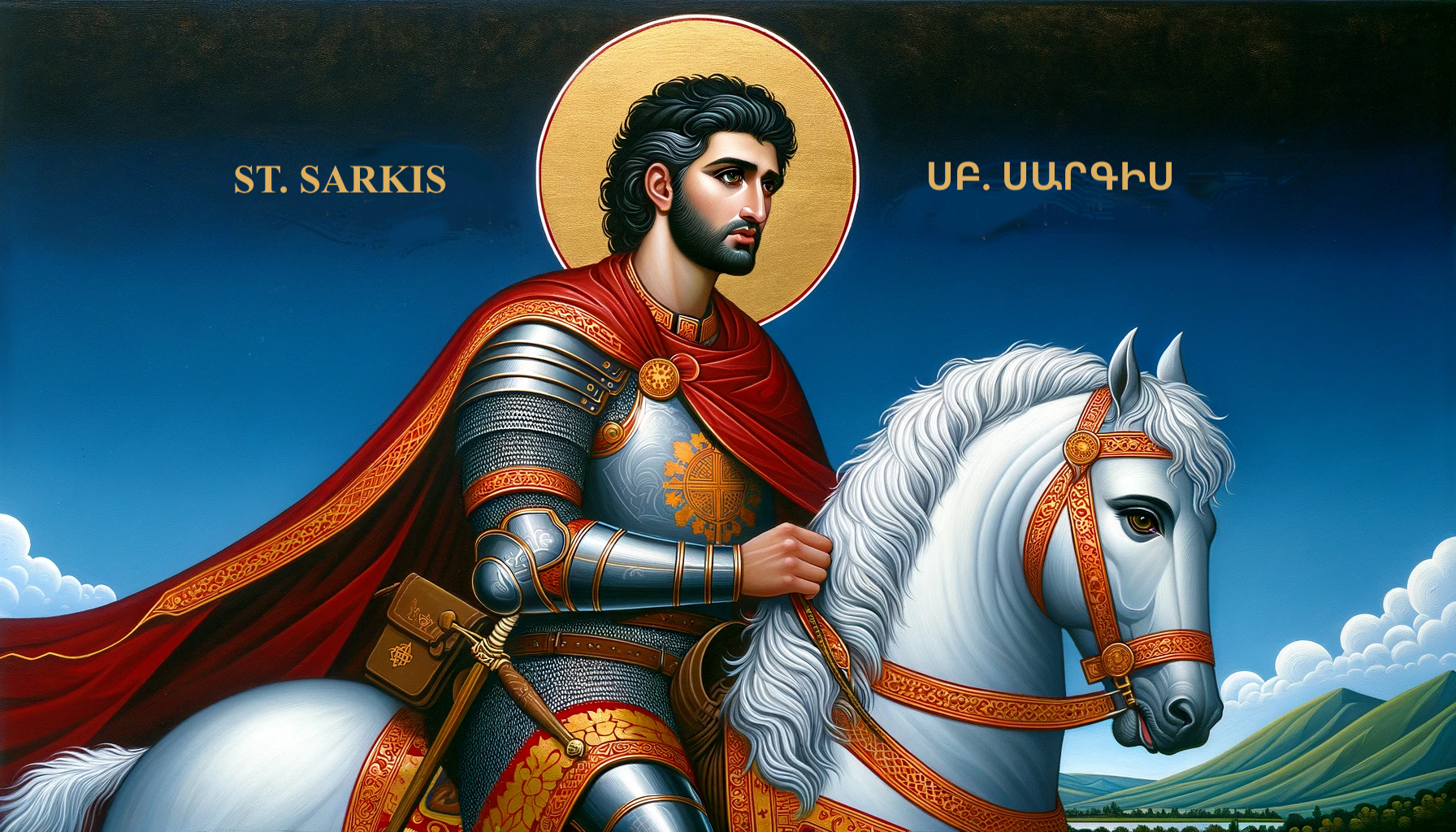
This Saturday we will celebrate the feast of St. Sarkis, one of the most beloved and treasured saints of the Armenian Church. St. Sarkis was of Greek blood, who lived during the fourth century and was from Caesarea of Cappadocia in Asia Minor (Modern-day Turkey). He rose through the military ranks as a consequence of his valiant campaigns and even became a trustworthy and faithful general to Emperor Constantine the Great, the first Christian Roman and Byzantine Emperor.
At the accession to power of Emperor Julian the Apostate in AD 361, St. Sarkis took refuge with his son Mardiros in Armenia. Later when the Pagan Emperor Julian fought against the Persians, St. Sarkis and his son went to Persia to join the Persian army in the service of Persian King Shapur II. St. Sarkis along with Mardiros fought with great bravery against Julian’s defeated army. St. Sarkis was also able to convert many Persian soldiers to Christianity.
King Shapur II eventually discovered that St. Sarkis was a Christian and asked him to abandon his faith and embrace Zoroastrianism instead. Zoroastrianism was a dualistic faith believing in the existence of two gods: one that is all good and one that is all evil. The king gave him this option because he did not want to lose the faithful and courageous service of his top general. Both St. Sarkis and his son steadfastly refused to abandon their faith.
King Shapur II’s promises of higher positions and of wealth did not cause St. Sarkis and Mardiros to alter their firm stand. They would rather die than deny Christ. Finally, the king executed both St. Sarkis and St. Mardiros. After the death of St. Sarkis, fourteen of his soldiers who had become Christians came to bury the saint. These soldiers also met a martyric death at the hands of the Persian king for simply burying their teacher in Christ.
For his dedication to Christ and willingness to serve and lay down his life for the glory of God, hymns have been written about him and many titles have been given to him. Yet one title stands out and is used multiple times: արագահաս/arakahas, which translated means “one who arrives quickly”.
St. Sarkis is referred to as the one who arrives quickly during our time of need. He is one who does not wait to answer the call of those in need, especially when God is the one calling on him. He does not make excuses or wait for the right time to do something, but immediately answers the call.
Why then have we, the Armenian people, adopted St. Sarkis into our culture and national identity?
Why do we name children after him and have churches and cathedrals in his name?
Why do we hold so dear to our hearts a Greek soldier, who fought for the Romans and then the Persians?
How has he become one of the most beloved saints in our church?
There is something in St. Sarkis that we wanted to emulate and it is that very word we use over and over for him in the hymns: արագահաս/arakahas. We wanted to act the same way when Christ calls on us to serve. Naturally the question we must ask is: do we do this in our daily lives?
If we are honest with ourselves, many of us cannot hold the title “արագահաս/arakahas”. When we are called upon by God to do His will and fulfill His commandments, many of us take our time, waiting for it to be convenient for us and our schedule. We do not rush, we do not hurry, we do not make haste to do what is needed for God.
And then there are many more of us who expect someone else to do it, saying, “It’s not my job or my responsibility”. We think if we wait long enough, someone else will do the job being asked of us. We see this in our churches, households, and workplaces.
Yet, as Armenian Christians and those who honor and celebrate St. Sarkis, we must be like him, արագահաս/arakahas, always ready to serve and to fulfill God’s will and commandments. In a world full of sin, death, and demons, we are the front line of attack against hopelessness, fear, and hatred. When we see the world going against Christ, as St. Sarkis did, we must rise up and wage war against the world, not necessarily with guns and bullets, but with the spiritual weapons of prayer, fasting, and almsgiving (Matthew 17:21).
May the memory of the righteous St. Sarkis, who arrives quickly in times of need, remain ever luminous in our lives, so that we may follow him to the Holy Trinity and eternal life.
By Fr. Ghevond Ajamian
